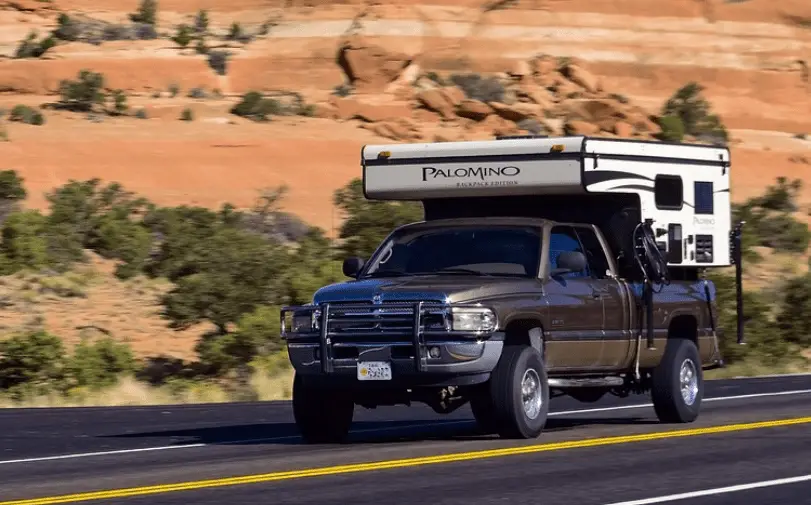Table of Contents
Preparing to purchase your first camper is an exciting investment for your future road trip and camping adventures. There are plenty of options available on the market, so choosing one that best fits your needs can be a challenge. There are some significant benefits to owning a truck camper that will meet your family’s needs and serve you well for years to come.
*This post may contain affiliate links. As an Amazon Associate we earn from qualifying purchases.
When preparing to make this investment, there are 10 things you need to remember before buying a truck camper.
What Is a Truck Camper?
A truck camper is a term that describes a recreational vehicle, or RV for short, which can be transported in the bed of certain types of pickup trucks. Truck campers are highly adaptable and can go literally anywhere your pickup truck does, making them handy for a variety of uses and lifestyles.
Truck campers come in a multitude of configurations with an assortment of amenities. Some campers have stoves, heaters, air conditioners, ovens, refrigerators, microwaves, and bathrooms. These campers can be transported in your truck bed and should be strapped to the truck either with tie-downs or chains.
When not strapped onto your truck for transport, the camper is stabilized by four corner jacks which can be adjusted on uneven ground to make sure the camper sits level.
Campers are an excellent choice for anyone that spends plenty of time outdoors or on the road. They allow you to enjoy the adventure of exploring the great outdoors while still maintaining some of the comforts of home.
The Benefits of Owning a Truck Camper
There are many benefits to owning a truck camper. Below, we outline them for you.
Multi-Use Capabilities
One of the primary benefits of owning a truck camper is its multi-use function and capabilities. The camper’s rig allows you to tow everything from fishing boats to utility trailers to jeeps while still being easily removable from your truck. This means you can use your truck as normal for everyday driving and load it up with ease for your next recreational trip.
Truck campers are easy to handle and do not take up too much extra space if you are trying to park in a tight spot. When you are on your next camping trip, you will not need to worry about maneuvering the rig as you would with a towable RV or motorhome. The camper sits affixed to your truck bed and allows for a minimum amount of space when parking at a campsite or in a town.
If you are interested in off-roading, a truck camper is your best bet to move with ease and not have to worry about a bulky, towable rig in the back. The nature of a camper allows you to bring it with you wherever you wish without having to tailor your route to accommodate any extra rigging.
Affordable
As a truck camper does not require towing gear, it is very affordable to own and maintain. With towable rigs, there are tires, brakes, and bearings to service at least yearly. With a truck camper, you need to perform routine maintenance on your truck per usual, and only occasionally make adjustments or updates to your rig.
Another great aspect of a camper is that most states categorize it as cargo instead of an RV. This means you may not be required to pay licensing and registration costs as you would with towable RVs. Insurance is much cheaper for a truck camper, with some rates being as low as $20 per month for comprehensive coverage.
Easy to Store
One of the primary benefits of owning a truck camper is that it is so easy to store. Unlike a towable rig that takes up a lot of space and may incur steep storage costs, you can store your camper either on your property or in a storage facility for a nominal fee.
Fuel Efficient
Truck campers are incredibly fuel efficient, enabling you to get much better mileage with fuel usage than you would with a towable RV. In fact, some camper owners can keep costs down to 10 to 15 miles per gallon.
10 Things to Remember About Purchasing One
When you are considering the purchase of a truck camper, there are a number of things to think about that may not seem important at the moment.
1. Truck Model
Before you buy your camper, take a minute to note the model of your truck. There are specific manufacturers which will enable you to carry a camper in the back of your truck, so you want to make sure yours is one of them before proceeding further. These truck models are the Chevy Silverado, Toyota Tundra, Nissan Titan, GMC Sierra, Ford F-Series, and Dodge Ram.
2. Potential Expenses
Before you buy your truck camper, you will want to evaluate the potential expenses you might incur. Undoubtedly, having a camper could save you considerable costs in the long run as opposed to if you were to stay at a hotel.
However, look at the money that will need to be spent on things like connecting your water and electricity and any dumping fees for waste from your camper’s bathroom. Examine what the difference will be in your gas mileage due to the added weight, and what it will cost to maintain things like screens, windows, and seals.
3. Purpose
This may seem like an obvious point, but remember to identify your purpose in purchasing a truck camper. If you will be off-roading or camping often, as opposed to only occasionally, the amenities and size camper you invest in will vary.
4. Size
After confirming that your truck can hold a camper as noted above, examine the size truck bed you have. With truck campers, you will typically look at short and long bed sizes. The weights vary between 1/2 ton, 3/4 ton, 1 ton, and above, so making sure your truck is configured to handle the right size camper is essential.
5. Capacity
When considering buying a truck camper, you need to analyze what the hitch and tow capacity of your truck is. Make sure that your truck is fitted to handle the rig you are looking at. Look at your truck’s manual and talk with your mechanic to get some initial advice. If your truck has to be modified to allow for the installation of a camper, this will require some additional costs you should know of before moving forward.
6. Stabilizer
It is always a good idea to see if your vehicle will require a sway bar or stabilizer if you are towing a boat or other trailer when the camper is in place. Improper weight distribution could damage the trailer you are towing and your vehicle. Beefing up the suspension on your truck or adding anti-sway bars might be a wise choice to counter the additional load weight.
7. Insurance and Taxes
No truck camper purchase would be complete without those pesky details like taxes, insurance, and transferring the title to the rig. Not all states require insurance, so look at your local regulations for further details. However, it is always the wisest option to purchase insurance for your truck camper in the event of an emergency.
You should also note, you will be required to pay taxes for purchase costs and some additional fees for transferring the title. These costs along with any insurance requirements are not considerable, but worth noting when determining how much you might have to pay in a given year.
8. What Will It Hold?
Always look at exactly what your truck camper will hold before making your final purchase. Your particular situation will dictate what you require the camper to hold and what items are not essential, but there are basics you should check for in terms of storage capacity.
Choose a camper that will hold items like bed sheets, sleeping bags, RV-friendly toilet paper, containers, and cooking supplies. You need to store other supplies like flashlights, camping chairs, rope, tarp, and camper locks too. Evaluate what you will use the camper for, how often you will use it, and determine what your storage needs are accordingly.
9. Hard Side or Pop-Up?
Hard Side and Pop-Up campers are the two main traditional types you will have to choose from. Pop-Up campers usually weigh far less, are easier to maneuver, and come at a lower cost.
Hard Side campers contain more storage capacity, improved insulation, and are altogether more cozy and homey. You can decide which type works best for you based on where you plan on taking the camper and how often you will use it.
10. Examine the Features
Finally, before buying your camper, examine the features it is equipped with to make sure they meet your specific needs. For instance, many smaller camper options do not contain a bathroom at all, instead, you will be using on-site facilities or alternatives.
Larger campers may offer a full-service bathroom with a shower, sink, and toilet in one, or have it configured separately much like in your own home. If you choose a slide-out camper, you will have much more space to live and rest in than you would without adjustable slides. However, slide out campers come at a much higher cost and weigh more than non-sliding options.
Putting the Topper On It
Choosing the truck camper that best fits the needs of your family is a process that takes time and careful consideration.
Before purchasing your camper, evaluate the purpose of this investment, decide how often you will use it, and where you plan on taking it. With some forethought and preparation, you will better determine the camper features and configurations that satisfy your requirements and budget.
Let us know your best topper tale, or camper yarn, down in the comments!

